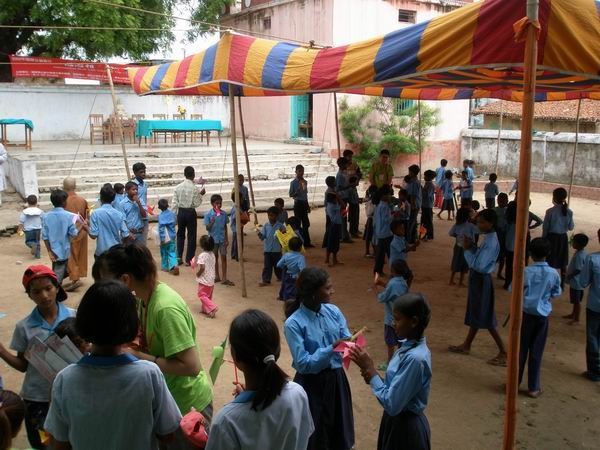回到佛陀的懷抱、回歸自我
佛教學系碩士班二年級林穎詩(加拿大籍)/撰稿
今年八月,我參加了中華佛光青年所舉辦的2009 國際公益旅行去印度一個月,共有十四位中華青年、兩位印度佛光青年加入,足跡遍佈德里、菩提迦耶,和Lokshala,從繁華到落後,從現代到傳統的時空交錯;從歡樂的夏令營,與本地人文化交流,到朝聖的心靈之旅。這一次旅程,我學習到很多。
慧顯法師很慈悲,為了讓我們多了解印度的文化,安排各種的課程,例如印度歷史,佛教現在在印度的狀況,印度文化等等課程。讓我更加體會若了解印度文化就會更了解佛陀為何應機說法。每一佛法的出現都有它的因緣。而且,我覺得佛陀會選擇出生在印度是因為印度很苦,所以會令人要精進修行解脫。而且印度有62種不同的哲學,佛陀所說的法有時候是要糾正那些錯誤的見解,也正因為如此佛陀說了不同的法讓不同根器的人能了解真理。
在德里文教中心三天培訓後,第一站,我們去了菩提迦耶的兩所學校帶夏令營。這里的小朋友都很容易滿足,而且很天真。反思自己的生活,有時候,我們認為我們的居住環境比印度好很多倍,我們也比他們快樂。但是,我問我自己,‘那是真的嗎?’我覺得印度的確是苦,但是印度人的苦大多數是因為外來的因素,譬如種姓,男女平等問題等。不過,只要三餐正常,他們就會很開心。相對的,我們的苦惱大部分是因為自己的貪嗔癡。我們真的比印度人快樂嗎?這個問題真的很需要去反省。我覺得有時候,所謂‘苦’的概念也是我們所定給印度人。也令我學習到真正包容一個人,要了解他的成長背景,站在他的立場想,而不是將自己的概念加諸在他們身上。
在這個旅程當中,最辛苦是在Lokshala 的時候,因為離開了佛光山道場的保護,必須真正的像印度人一樣生活、吃本地的食物。也是在這里,大部分的青年都生病了。至于我,我沒有生病,也覺得很適應。我深深覺得只要保持一顆包容心,如實接受就能很快適應。當我們在回去德里文教中心時,我真的覺得我回家了。這讓我想到 ‘處處無家,處處是家。’那感覺很棒,很自在。可能因為我從小就從香港移民去溫哥華,然後來臺灣讀書,有這種常常搬家的經驗吧,所以比較能很快適應新的環境。
我們去了幾個佛教聖地朝聖、佛陀成道的地方,靈鷲山,鹿野苑,恆河,那蘭陀遺跡等。我們在佛陀成道的地方做了兩次早課,也供養了佛衣,水果,食物,花等。我在那里做早課時真的覺得很慚愧,我想起,‘佛在世時我沉淪,佛入滅后我出生。’我就很想哭。
這一次,我最大的學習是要擁有一顆無所求的心。其實,去印度前,有兩次在大佛城所求的法語都是提醒我要有「無所求」的心,但是我都把它忘記了。不知道是不是因為在還沒有去印度前,我覺得我會學習到很多和會很感動。因為這一份‘有所得’吧,我在旅程當中,我沒有覺得自己學習到很多或佷感動。在離開印度的前兩天,再向慧顯法師請法時,他提醒我要有無所求的心。讓我覺得佷感動。我感動的是佛菩薩一路都在我的身邊提醒我,教導我。只是有時候,自己太迷惘,沒有聽到。而且,在那一剎那,我有一點感受到無所求的自在。雖然不知道,這自在能維持多久,但我會常常提醒自己。我也了解,無所求是很積極的,是隨緣的。 印度是佛陀的故鄉,希望自己有因緣再次回去。

圖說:教印度的小朋友製作風車,因為這都是他們第一次接觸與作風車,所以感到非常的興奮。
A Meaningful Summer
Every summer, I would be traveling back to Hong Kong to visit my relatives or passing my days in a very relax manner. This summer, I had decided to do something meaningful. I have joined the 2009 International Volunteering Trip to India, organized by Fo Guang Shan Buddha’s Light International Association Young Adult Division. This trip lasted for one month, from August 4th to September 4th. There were fourteen youths in total, including me. We stayed in three main locations, New Delhi, Bodh Gaya and Jharkand, respectively. Throughout this month, we had led summer camps in seven different elementary schools and interacted with 1820 children. Aside from the summer camps, we had also had various cultural exchanges with the local people.
In this trip, I have learned a lot. In order for us to have a further understanding of India, Venerable Hui Xian had organized a lot of different classes. For example, Indian history, contemporary Buddhism, and Indian culture and others. After learning from all these classes, I had realized that if we understand the Indian culture, then we would understand why Buddha taught all these Dharma. I think the reason why Buddha chose to be born in India is because India is full of suffering. Because of this suffering, people would be motivated to cultivate diligently. Also, Buddha preached in order to correct the 62 different kinds of philosophies existed in India.
After the three days training, we had finally started our journey. The first stop was Bodh Gaya, where we had led two summer camps. The children here satisfied easily, and they were very innocent. Seeing this sight made me reflect upon my life. Sometime, we think we are happier than the Indians because we are living in a better environment than them. However, I can’t help but to ask myself “is that true?” I think that India is full of suffering, but the sources of their suffering are mostly from the external factors, such as the caste system, and inequality between male and female. However, the Indians would be very happy when they could fulfill their three meals. For us, on the other hand, sufferings are mostly resulted from our greed, hatred, and ignorant. That is why I think we should really reflect upon our life. I think “suffering” is the concept that we imposed upon the Indians. In their eyes, this is their way of life. From this, I have learned that to be truly tolerant to another person means to understand their background and their life style because usually their actions are influenced by their life. We should try to step into their shoes instead of imposing ‘concepts’ onto them.
Out of this trip, Lokshala was the place where we encountered the greatest hardship because we had to live the way the local people live and eat local food. Because of this, most of the youths got sick. Everyday, almost two youths would need to take leave due to their sickness. As for me, I didn’t get sick. From this, I deeply realized that in order to adapt to a new environment, one needs to have a tolerate mind, and accept the environment as it is. One should not compare or discriminate the environment. When we got back to the Delhi centre, I felt I was home. I suddenly remembered a Chinese saying, “One has no home anywhere, but everywhere is one’s home.” This feeling was very great. In Lokshala, we also had various cultural exchanges with the locals, as well as went to several elementary schools to lead summer camps.
Aside from doing volunteering works, we had also visited several important Buddhist sites, such as the Vulture Peak, Bodh Gaya, Gaya River, Nalanda university and more. In the Mahabodhi Temple in Bodh Gaya, we had made an offering of the Buddha’s robe, fruits, food and flowers to the Buddha, as well as did our morning chantings there. I felt ashame when I was doing the morning chanting because I didn’t have the cause and conditions to be born in Buddha’s time.
One month passed by very quickly. This trip had come to an end. I wish I have a chance to go back to India again as India is the land of Buddha and the land of inspiration.
【佛大電子報第14期/2009年11月19日】